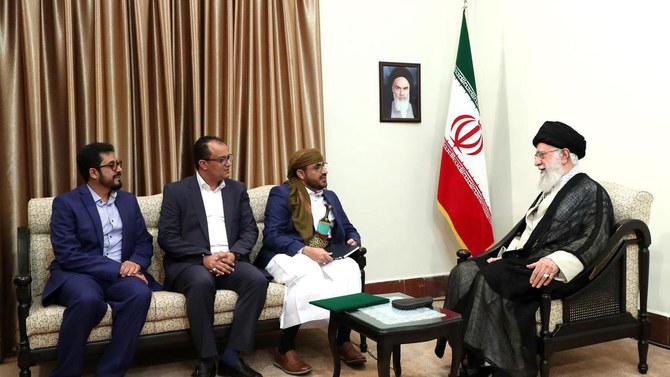BEIRUT: Lebanese Army Command on Saturday urged residents of southern border villages to avoid returning to their homes due to mines and other explosives left by Israeli forces.
The “procrastination in the withdrawal” of Israeli forces from the south has complicated the army’s deployment to the area, it said.
The 60-day period for the full withdrawal of the Israeli forces from the southern border area ends on Sunday.
The deadline was stipulated in a ceasefire agreement between Hezbollah and Israel, which invaded the Lebanese southern border area on Oct. 1.
Residents vowed on Saturday to return to their villages, despite an Israeli decision to postpone the withdrawal of its forces.
Israel blamed the Lebanese state for failing to “fully enforce” the agreement, and threatened to “retaliate with a military escalation against any Hezbollah response” to the delay.
The Israeli prime minister’s office said in a statement that the gradual withdrawal will continue, “in full coordination with the US administration.”
Lebanon’s new leadership views the Israeli withdrawal as a priority.
Army Command called on citizens to “remain responsible and adhere to its directives and the instructions of the deployed military units, to preserve their safety.”
President Joseph Aoun received a phone call from French President Emmanuel Macron on Saturday, his media office said.
“Macron went over the developments in southern Lebanon, the efforts to control escalation, and the appropriate solutions to ensure the implementation of the ceasefire agreement, and the measures to defuse the situation,” a statement added.
The French president told his Lebanese counterpart that he is holding talks to maintain the ceasefire and complete the implementation of the agreement.
Aoun highlighted the need to pressure Israel into implementing the provisions of the deal.
This would put end to its successive violations, notably the destruction of villages near the southern border and the leveling of lands, which will hinder the return of residents, Aoun said.
Ghassan Hasbani, a member of the Lebanese Forces parliamentary bloc, said: “The renewal of war is not the current concern, but rather the prolonged presence of the Israeli army in the south.
“It is Hezbollah that brought the Israeli army into Lebanon, and what will drive it out is adherence to the terms of the ceasefire agreement and international pressure,” he added.
Hasbani spoke of “deliberate or inadvertent tardiness in implementing the ceasefire agreement, whether through the delay in forming the monitoring committee or Hezbollah’s failure to seriously hand over its weapons and dismantle its infrastructure.
“We are not justifying the Israeli army’s continued presence in the south but have called for its withdrawal from the first day. We would have preferred to avoid causing its entry in the first place,” he said.
The Israeli army continued its violations of the ceasefire agreement on Saturday in the eastern sector of the border.
Earth mounds were raised to prevent citizens from advancing toward the area where Israeli forces are carrying out detonations and leveling additional structures and homes.
The Israeli measures included the closure of main and secondary roads leading to the town of Kfar Kila from the towns of Burj Al-Muluk and Deir Mimas. Additionally, the northern entrance to the town of Yaroun was bulldozed, and the roads and secondary intersections leading to the villages of Bani Hayyan, Talloussah, Houla and Aitaroun were plowed.
Israeli media reported: “The Israeli army is on high alert, with the northern command, air forces, and operations division of the general staff preparing for a range of scenarios should Hezbollah and civilians attempt to return to their homes on Sunday, and challenge the Israeli military.”
Israeli jets conducted aerial incursions over the southern region, flying at medium altitude.
Residents of southern Lebanese border villages have continuously been warned by Israel to avoid returning to their homes.
Several residents in the south received phone calls from international numbers, cautioning them to avoid traveling to the frontline villages on Sunday and urging them to stay away from the southern region.
Military units of the Lebanese Army continued engineering surveys, road clearing and the handling of unexploded ordnance in the western and central sectors.
Army Command said it is “closely monitoring the operational situation, particularly regarding the violations of the agreement and assaults on Lebanon’s sovereignty, in addition to the destruction of infrastructure and the demolition, and burning of homes in the border villages by the Israeli enemy.”
A team from the Lebanese Red Cross and Lebanese Civil Defense continued to search for the bodies of Hezbollah fighters in the towns of Al-Jabain and Shihin.
The Israeli army raised an earthen berm in the middle of the road leading to the town of Qantara in the Marjeyoun district.
A citizen of the town was shot in the hand by Israeli forces and taken to hospital.
UNIFIL forces delivered a message to the commander of the Southern Litani sector in the Lebanese Army, Brig. Gen. Edgar Lawandos, pledging to provide support.
In an unprecedented move concerning Palestinian camps, Lebanese Army Command announced the takeover of “military centers previously occupied by Palestinian organizations inside Lebanese territory.”
The army conducted surprise raids at the entrance of the Burj Al-Barajneh camp in the southern suburbs of Beirut and proceeded to remove unauthorized commercial structures.
Forces also seized a former center of the Popular Front for the Liberation of Palestine, and two former centers of the Fatah Al-Intifada organization, near the Beddawi refugee camp in Tripoli.
The army also seized weapons and ammunition, in addition to military equipment and surveillance devices.
It is “in accordance with the ceasefire agreement, which stipulates the dismantling of all illegal military installations, starting from south of the Litani,” a statement said.
“These missions are part of the framework for maintaining security and stability, and extending the authority of the state across various regions of Lebanon.”
Lebanese army units took control of all military points at the entrances of the Beddawi camp since early morning, amid a significant deployment of troops in the area.

























